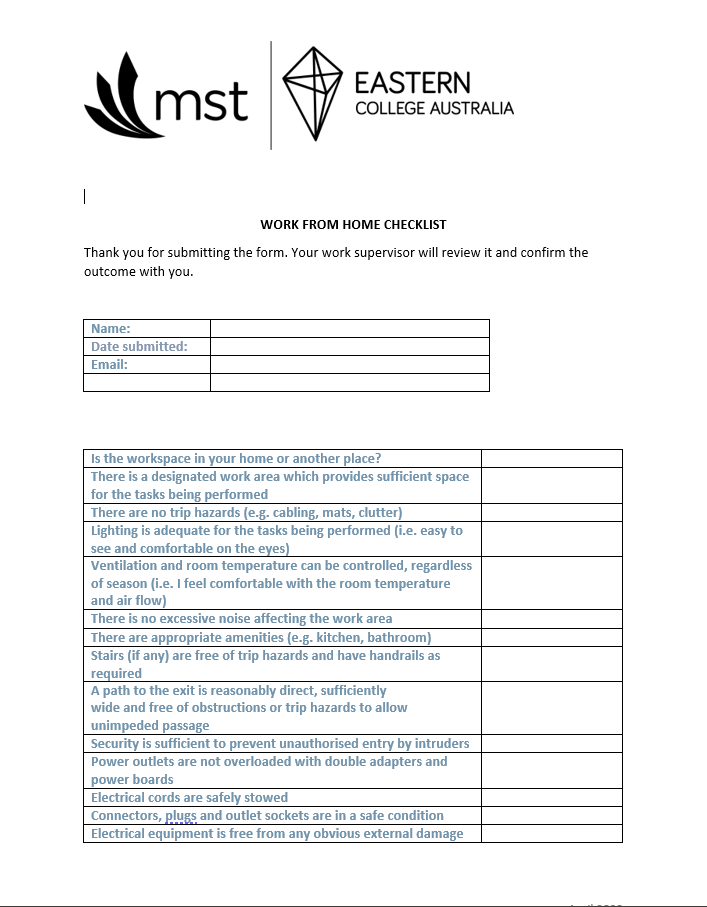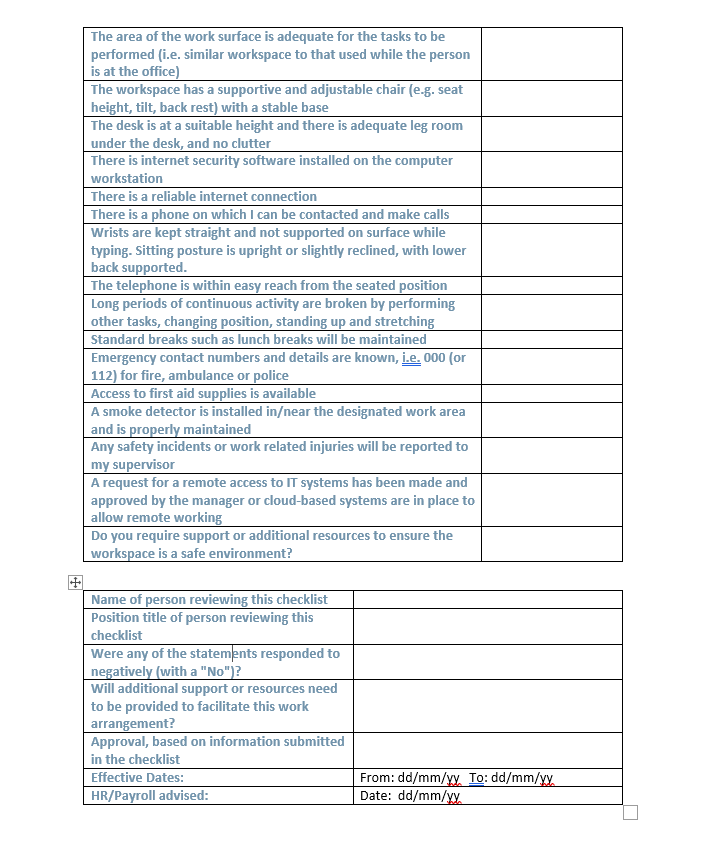Eastern College Australia recognises the importance of formal and informal flexible working arrangements in maintaining a diverse and adaptable workforce and will assess all employee requests for flexible working arrangements related to any personal attribute, balancing work, life and family needs. ECA acknowledges that flexibility is a key enabler of gender equality.
The purpose of this policy is to outline provisions relating to formal and informal Flexible Working Arrangements as well as guidance for ECA staff and supervisors to follow in considering flexible working arrangements requests.
The Flexible Working Arrangements Policy applies to all ECA staff.
Formal: Formal work arrangements are arrangements whereby a employee seeks a permeant flexible work arrangement e.g. work from home every Monday and Wednesday.
Informal: Informal work arrangements are arrangements whereby they not structure, ad-hoc and are non-permanent arrangements e.g., the employee is not feeling well and request to work from home.
Flexible Working Arrangements
Flexible Working Arrangements are based on Section 65 of the Fair Work Act 2009, National Employment Standards (NES) and the Educational Services (Post Secondary Education) Award 2020.
A flexible working arrangement may include changes in hours of work, changes in patterns of work, and changes in location of work. Employees may request flexible working arrangements in certain situations.
Flexible work options which may be considered include:
- permanent, part-time work
- graduated return to work (for employees returning from parental leave or other long-term absences), e.g., the employee returns part time and then builds up to full-time work flexible start and finish times
- flexible rostering such as working split shifts
- job-sharing - where two or more employees share one full-time position, each working on a part-time basis
- work from home
- purchased leave (48/52 leave) – where employees take an additional four weeks leave per year by adjusting their salary to 48 weeks paid over the full 52 weeks
- compressed hours – where the employee works additional daily hours to provide for a shorter working week or fortnight
Entitlement
All ECA employees may request flexible working arrangements. However, the following list of employees (other than a casual employee) who have worked with the Eastern College Australia / Melbourne School of Theology for at least 12 months have particular rights with respect to flexible working arrangements:
- Is a parent or has responsibility for the care of a child of school age or younger;
- is a carer;
- has a disability;
- is aged 55 or older;
- is experiencing family violence or provides care or support to a family or household member experiencing family violence.
Application Process
Employees looking for formal flexible work arrangements are required to discuss their request with their supervisor. A request for a formal flexible working arrangement should be made in writing by the employee and submitted to the employer at the earliest opportunity. For those on parental leave, a request for flexible working arrangements should be submitted no less than six weeks before the end date of any period of unpaid parental leave.
The request should set out details of the change sought and the reasons for it.
Circumstances that may be relevant to determining whether an acceptance is or is not reasonable include:
- the nature of the employee's work and parental or carer responsibilities
- the nature and cost of the arrangements required for an employee to fulfil their family or carer responsibilities
- the financial circumstances of the employer
- the size and nature of the workplace and the employer's organisation
- the effect of the flexible working arrangements on the workplace, including the financial impact on the business
- the consequences for the employer of having the flexible working arrangements
- the consequences for the employee of not having the flexible working arrangements.
Other factors that might be relevant in a particular case include:
- when the arrangements are to commence
- how long the arrangements will last
- information that has been provided by the employee about their situation
- the accrued entitlements of the employee, such as personal, carer or annual leave
- whether any legal or other constraints affect the feasibility of the employer accommodating the responsibilities, such as occupational health and safety laws or award penalty rates.
Supervisors of an employee requesting formal flexible work arrangements have a responsibility to:
- Meet with the employee to discuss their request for a flexible work arrangement
- listen carefully to the request
- ask questions to understand why flexibility is needed
- genuinely consider whether they can agree to the request or meet the need in a different way, including by seeking advice from Human Resources and their management line
- have regard to the consequences of the refusal for the employee
- discuss alternative working arrangements with the employees if they are considering refusing a request
- explain decisions about the request clearly in writing within 21 days of receiving the request
Informal flexible work arrangements can be requested on an ad-hoc basis and an informal request must be submitted to their supervisor either in person, via email, or direct message.
Grounds for the Employer Refusing Requests
Supervisors are obliged to seriously consider a request for flexibility. Factors that may be relevant to the question of what constitutes a reasonable refusal of a request for a flexible working arrangement include:
- The effect on the workplace and the employer’s organisational requirements, including the financial impact, and the impact on efficiency, productivity and customer service
- The inability to organise or allocate work among existing staff
- The inability to recruit a replacement employee or the practicality or otherwise of the arrangements that may need to be put in place to accommodate the employee request
- The significant negative impact on customer service.
Where a request is refused, managers must have reasonable grounds for doing so. Human Resources can provide advice on how to test this – sometimes a trial arrangement can help establish whether something is viable.
Where the request is refused, managers may agree upon alternative changes to the employee’s working arrangements and note the agreed changes in their written response.
Record Keeping
If a request for a flexible work arrangement is approved, this should be clearly documented in writing. The documentation must record the duration of the arrangement, and any trial or review periods that apply.
If a request for a flexible working arrangement is declined, and there is no ability to offer alternative working arrangements, the refusal must be communicated to the employee in writing and include all of the following:
- details of the reasons for the refusal
- the particular business grounds for refusing the request
- how those grounds apply to the request
- any changes that the Manager would be willing to make that would accommodate the employee’s circumstances to any extent, and
- a statement that any unresolved dispute regarding the request may be referred to the Fair Work Commission.


